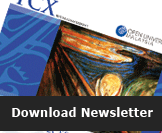Editor's Note
A lot of compliments came our
way from various quarters when
we released TCX 18. Some of
you wrote in to say that you liked the
new look and that the newsletter was
interesting, professional, a welcome
change and a source of information on
tutors' views and activities. This pat on
the back means a lot to us. We are now
even more driven to make each issue of
TCX a fulfi lling treat for you.
Of course, the fact remains that we
did not accomplish this success on our
own. A lot of work by many people went
into the publication of this newsletter. We don't believe that too many cooks
spoil the broth. We believe this makes it a whole lot better! One person could
accomplish a lot if he or she is tenacious but a group could accomplish much
more. So, please do contribute to TCX. Drop us a line at tcx@oum.edu.my.
This issue of TCX focuses on exams. It touches on both traditional and
alternative forms of assessment. This is relevant because in 2010, the Education
Ministry plans to introduce a new curriculum for primary schools that
emphasises school-based assessment. Such a radical shift from exam-oriented
education at the primary school level warrants similar change in higher levels of
study as well. This is especially so in the case of our University, which strives
to produce holistic graduates who will excel in both traditional and alternative
forms of assessment. Currently, part of the marks are given for examinations
while the remainder come from assignments and online participation. OUM is
also embarking on the move to introduce recognition of prior learning as a way
of assessing potential learners.
Some learners might respond to the idea of exams with a tinge of anxiety,
similar to that of the fi gure in the Edvard Munch painting, "Scream," featured
on the cover. In contrast, there are learners who are actually motivated by exams
and look forward to performing well in them. Consequently, they come out with
flying colours.
Exams are neither good nor bad. Whether they are viewed positively depends
on the learners. The key concern is to help learners to derive more meaningful
learning from exams. But how do we achieve this?
This is a question which may receive diverse answers. We will need to assess
the current situation, the resources available, the challenges, obstacles, gains and
benefi ts before we can make up our minds on which way to go. This issue of the
TCX aims to initiate dialogue on some of these concerns.
We hope what we present here will get you thinking out of the box about
assessments, whether they be traditional or alternative.
Regards,
Azeezah Jameelah
Editor
|

